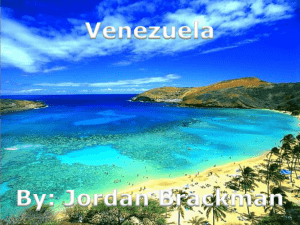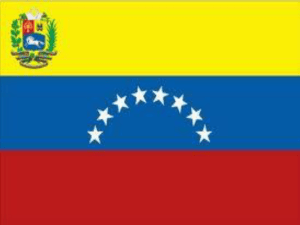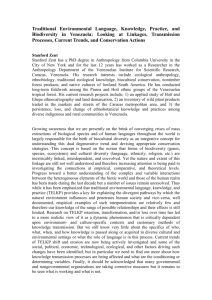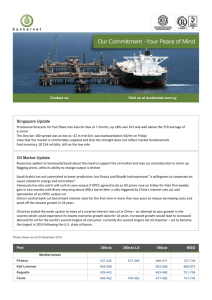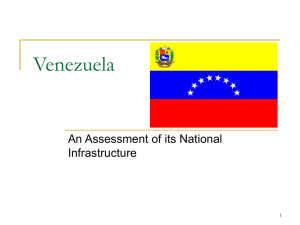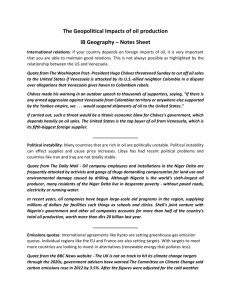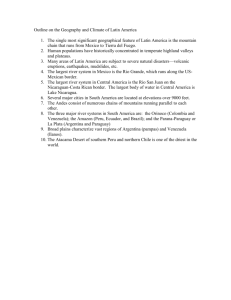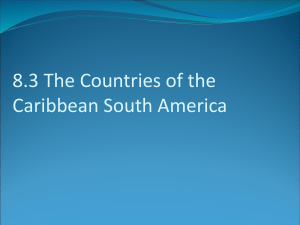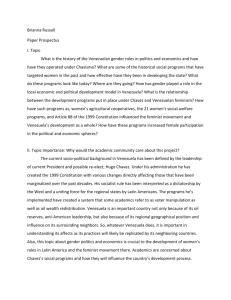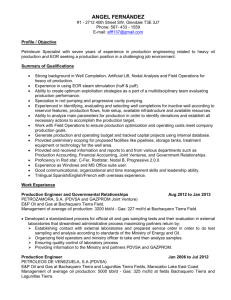More Will Be Revealed - The Rocky Mountain Conference UCC
advertisement
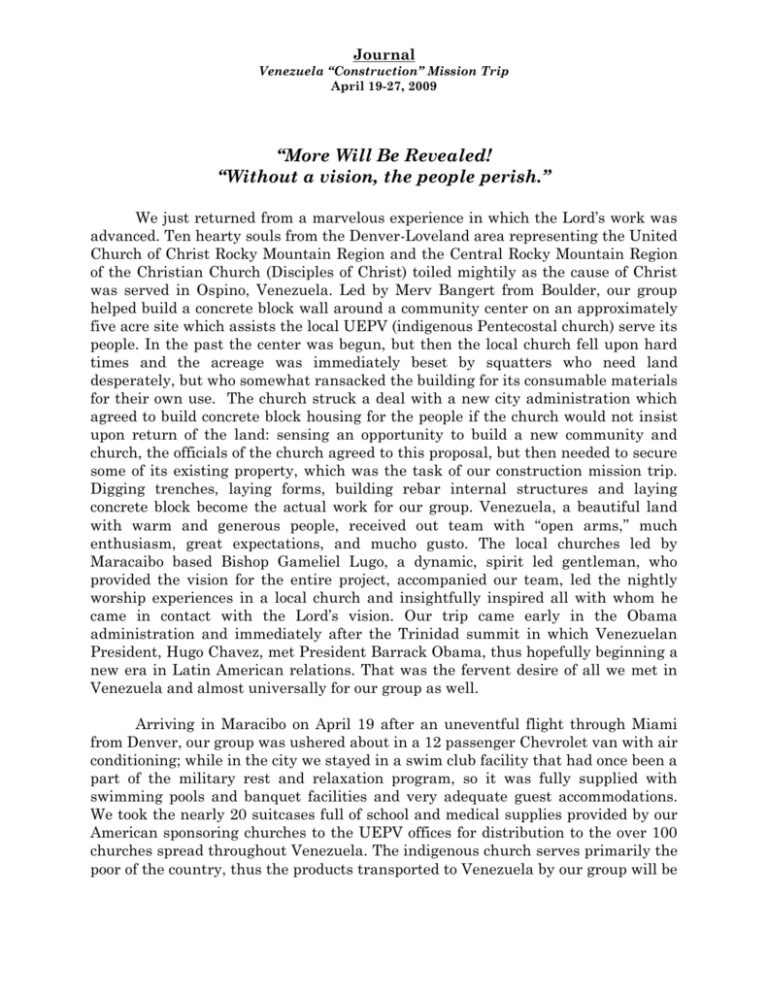
Journal Venezuela “Construction” Mission Trip April 19-27, 2009 “More Will Be Revealed! “Without a vision, the people perish.” We just returned from a marvelous experience in which the Lord’s work was advanced. Ten hearty souls from the Denver-Loveland area representing the United Church of Christ Rocky Mountain Region and the Central Rocky Mountain Region of the Christian Church (Disciples of Christ) toiled mightily as the cause of Christ was served in Ospino, Venezuela. Led by Merv Bangert from Boulder, our group helped build a concrete block wall around a community center on an approximately five acre site which assists the local UEPV (indigenous Pentecostal church) serve its people. In the past the center was begun, but then the local church fell upon hard times and the acreage was immediately beset by squatters who need land desperately, but who somewhat ransacked the building for its consumable materials for their own use. The church struck a deal with a new city administration which agreed to build concrete block housing for the people if the church would not insist upon return of the land: sensing an opportunity to build a new community and church, the officials of the church agreed to this proposal, but then needed to secure some of its existing property, which was the task of our construction mission trip. Digging trenches, laying forms, building rebar internal structures and laying concrete block become the actual work for our group. Venezuela, a beautiful land with warm and generous people, received out team with “open arms,” much enthusiasm, great expectations, and mucho gusto. The local churches led by Maracaibo based Bishop Gameliel Lugo, a dynamic, spirit led gentleman, who provided the vision for the entire project, accompanied our team, led the nightly worship experiences in a local church and insightfully inspired all with whom he came in contact with the Lord’s vision. Our trip came early in the Obama administration and immediately after the Trinidad summit in which Venezuelan President, Hugo Chavez, met President Barrack Obama, thus hopefully beginning a new era in Latin American relations. That was the fervent desire of all we met in Venezuela and almost universally for our group as well. Arriving in Maracibo on April 19 after an uneventful flight through Miami from Denver, our group was ushered about in a 12 passenger Chevrolet van with air conditioning; while in the city we stayed in a swim club facility that had once been a part of the military rest and relaxation program, so it was fully supplied with swimming pools and banquet facilities and very adequate guest accommodations. We took the nearly 20 suitcases full of school and medical supplies provided by our American sponsoring churches to the UEPV offices for distribution to the over 100 churches spread throughout Venezuela. The indigenous church serves primarily the poor of the country, thus the products transported to Venezuela by our group will be Journal Venezuela “Construction” Mission Trip April 19-27, 2009 graciously used and the hosting church was profuse in wanting our group to extend their thanks for your generous donations. Life can be sometimes harsh for the local people who thrive in a climate generous with natural resources, but the people sometimes have been ill served by its own past leadership. We found that our hosting churches gladly supported President Chavez who remains very popular among the poor who have been the recipients of much recent largesse from the government which has appropriated its now nationalized and very rich oil industry away from the previous owners, the landed aristocracy who apparently resent losing its ownership of these vast oil resources, even for the people’s use. President Chavez has instituted his own brand of socialism in which the people’s ability to make their own decisions seems to have been expanded. The President has completely overhauled the public education system that is now free to the people including higher education, whereas in the past all of this was funded by tuition only. He has expanded health care for all citizens, improved the roads that are already quite modern, and improved other infrastructure as well. This ambitious program has made President Chavez very popular with the rank and file citizen, but not so popular with the old guard aristocracy. Crime and nepotism remain a priority for his administration to combat. While we were in the country, the arrest and exile of the mayor of Maracaibo, a frequent opponent of the President was announced. The local citizens seemed pleased that for once, at least, somebody was addressing the corruption problem. We were assured in our conversations with various Venezuelan citizens that if the President makes efforts to address this constant corruption problem, he will remain, but if he would join this effort instead of oppose it, he can be voted out after any sixyear term. Many of our group who have supported American president Barrack Obama shared the enthusiasm of our hosts for improved relations between our two countries, and for all of Latin America for that mater, and they applauded our President’s recent efforts to relax the restrictions on Cuban Americans, for instance, and expressed a hope that the decades-old embargo upon Cuba may soon be lifted. The vision for our efforts became apparent to us after traveling on Tuesday on the nearly 8 hour drive to Ospino in central Venezuela, the group arrived at the hostel where we stayed in the heart of the city of 12,000 souls. This typical town sees very little tourism, but is a beautiful small city with the local church on the plaza, surrounded by shops and haciendas in Spanish architected abundance. We took our meals in the home of Omar and Gladys Gonzales, who were commissioned during our visit as co-pastors of one of Ospino’s four UEPV churches. All pastors serve without pay as tentmaker pastors in the style of the Apostle Paul. Our first impression upon arriving at the Finca, or farm, which was the site of our work project rests on the outskirts of the town. We soon came to realize that what Journal Venezuela “Construction” Mission Trip April 19-27, 2009 appeared to be a simple wooded lot was a “conference center” with walls around it, but no wall currently existed, but in the Bishop’s planning, it was there so the conference center could be utilized for church functions such as the local church leadership meeting that was held while we were there with the newly installed Mayor, the son of a Pentecostal minister. We tended to draw local citizens interest in our uniqueness because north Americans are not seen much in the country, so our two teenagers were generously and warmly received by all children and youth with whom they came in contact; Loveland’s Dawn Nottingham especially drew many children and youth to her by making balloon animals and other objects d’art. Each work afternoon was ended by a pick up game of “Mango baseball” since the property was lined with many mango trees which had numerous fruits available on the ground underneath each tree. Dana, and Johnstown’s Harper Lubbick, were both very popular with the teenaged boys especially. Each night, our day was closed out by a 3-hour church service in Los Animos church where local worshippers were led in worship by largely teenage and young adult musicians/singers. Venezuelan music is beautiful, unique, soulful, loud, and enthusiastic. Rev. Jane Anne Ferguson, associate pastor of Denver’s First Plymouth Congregational United Church of Christ, Matthew Royster of Denver, and Loveland’s Dennis Miller, shared their faith in sermons warmly received by the congregation. Bishop Lugo preached the closing service on Saturday. His deep and readily apparent faith was coupled with a keen theological perspective that made our experience meaningful and profound. The Bishop presented the Christian faith in ways that anyone could easily grasp and receive. He provided the vision for our entire project and we came to appreciate his keen understanding of human aspirations, his ability to motivate his churches, and his deep love for everyone. He emphasized each night the need for all persons of faith to look one another fully in the face and express love and compassion in benediction and thanks for the day. The Bishop’s insight leads his flock in mutual respect, deep faith in God’s love and power, and in spreading God’s love throughout the world. We were honored on our last night in Marabaibo with a steak dinner at his home where he expressed his and his churches’ thanks for our efforts on their behalf. After three days of trenching, cementing, building, and celebrating, the Bishop insisted that our group rest on the fourth day, and so we traveled to the national Catholic shrine in Coronato, where we enjoyed this immensely beautiful stained-glassed sanctuary dedicated to the local native population who in 1652 had built a small shrine on that site after an apparition from the Virgin Mary. Pope John Paul II in 1996 had visited this site on his trip to Venezuela and he raised this site to become the national shrine for the entire country. It was quite impressive in its grandiosity and as a simple statement of faith for the entire country. On Sunday, April 26, after a fond farewell to our hosts, Omar and Gladys and their extended Journal Venezuela “Construction” Mission Trip April 19-27, 2009 family, and many other Ospinans who dropped by to bid us farewell, we departed for the 8-hour trek to Maracaibo and the dinner at the Bishop’s house. After a brief sleep, we were roused for a 4:30 a.m. arrival at the airport for our 7:20 a.m. flight to Miami. Upon arrival back in our own country, the group traveled to South Beach, an immensely affluent section of the city where we all remarked that now we could see more in perspective how the “other half” purports to live its life. We were struck by the polar opposites of life that we witnessed: The rich, plain, warm, human, generous, deeply Christian Venezuelan life style and in Miami, the affluent, humanistic, self-possessed lifestyle of the “beautiful people” whom we saw at South Beach before our 6-hour flight back to Denver where we were warmly greeted by family and loved ones. Two expressions watermarked our stay in Latin America: “More will be revealed” expressing the often changing plans for which we were encouraged not to over anticipate, and “We may suffer, but we will not die” although some of our number had momentary aches or pains, or minor injuries, none of us came close to leaving this life prematurely, as a matter of fact, we all returned to the US more keenly aware of the need for better international understanding, a new appreciation that Christ is the common denominator in all life around the globe, and that our dedication to His cause binds us together. We became more fully aware that in God’s good timing, He will reveal to us more of His vision for our lives and although we may have bumps along life’s way, so long as we remain committed to Him, we can enjoy His vision for mutual service. Members of our work mission will be happy to share further their experiences in Ospino and Maracaibo. Members of the group were: Merv Bangert from Boulder, his daughter Leslie from Johnstown, her daughter, Harper Lubbick, Jane Anne Ferguson, from Denver, Matthew Royster from Denver, Bill Dodge from Silverton, Greg Nottingham, one of our interpreters (along with Leslie), his daughter, Dana, Dennis Miller, and Karl Winegardner all from Loveland. Our group concluded that the vision that the people of UEPV follow and which the appreciative folks of Ospino have espoused will hold them in good stead as they minister to God’s people there in the southern Americas. They are in no danger of perishing because of an inadequate vision: quite the contrary! Karl Winegardner, Co-Journalist for the Mission Team
